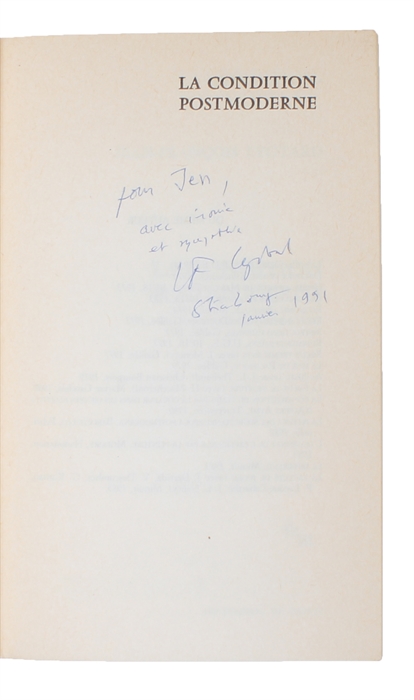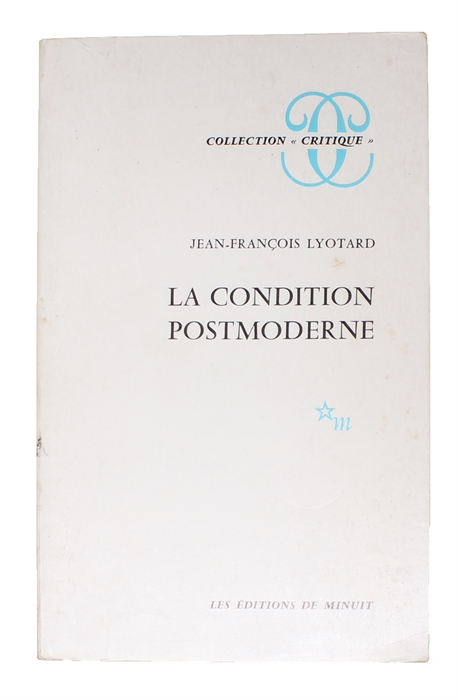PRESENTATION-COPY
LYOTARD, JEAN-FRANCOIS.
La Condition Postmoderne. Rapport sur le savoir.
(Paris), Minuet, (1979). [Recte: Les Ateliers de Normandie, 1988]. 8vo. Original wrappers. A bit of minor soiling to wrappers, otherwise very fine. Apart from some underlinings to the first few pages, internally very nice and clean. 109, (3) pp.
Author's presentation-inscription "pour Jen,/ avec ironie/ et myopathie/ J-F Lyotard/ Sharlony [?]/ Janvier 1991".
Lovely presentation-copy of a later issue of the groundbreaking work that introduced the term "post-modernism" and fundamentally altered the interpretation and course of (post-)modern philosophy. With this book, Lyotard set the agenda for the discussion of the postmodern, which began in the 1980'ies. Lyotard's main point is that modern society has become postmodern because man no longer believes that scientific and technological progress will lead to freedom, prosperity, and enlightenment for all. For postmodern man, doubt is the dominating factor.
The term "postmodernism" was previously only used by art critics, but with "The Postmodern Condition", Lyotard introduced it in philosophy, with the following quotation: "Simplifying to the extreme, I define postmodern as incredulity towards metanarratives", altering our comprehension of this most recent period of philosophy.
"The term "postmodern" came into the philosophical lexicon with the publication of Jean-François Lyotard's "La Condition Postmoderne" in 1979 (English: "The Postmodern Condition: A Report on Knowledge", 1984), where he employs Wittgenstein's model of language games (see Wittgenstein 1953) and concepts taken from speech act theory to account for what he calls a transformation of the game rules for science, art, and literature since the end of the nineteenth century. He describes his text as a combination of two very different language games, that of the philosopher and that of the expert. Where the expert knows what he knows and what he doesn't know, the philosopher knows neither, but poses questions. In light of this ambiguity, Lyotard states that his portrayal of the state of knowledge "makes no claims to being original or even true," and that his hypotheses "should not be accorded predictive value in relation to reality, but strategic value in relation to the questions raised" (Lyotard 1984, 7). The book, then, is as much an experiment in the combination of language games as it is an objective "report."
On Lyotard's account, the computer age has transformed knowledge into information, that is, coded messages within a system of transmission and communication. Analysis of this knowledge calls for a pragmatics of communication insofar as the phrasing of messages, their transmission and reception, must follow rules in order to be accepted by those who judge them. However, as Lyotard points out, the position of judge or legislator is also a position within a language game, and this raises the question of legitimation. As he insists, "there is a strict interlinkage between the kind of language called science and the kind called ethics and politics" (Lyotard 1984, 8), and this interlinkage constitutes the cultural perspective of the West. Science is therefore tightly interwoven with government and administration, especially in the information age, where enormous amounts of capital and large installations are needed for research." (SEP).
Order-nr.: 48962


